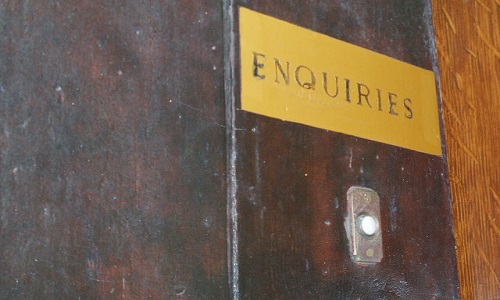Differences between Enquiry and Investigation
I look up enquiry in the Pocket Oxford English Dictionary, and it says:
- an act of asking for information
- an official investigation
Our topic is the difference (in meaning, naturally!) between enquiry and investigation, but going by the POED, don’t they seem rather synonymous?
Let’s see what Merriam-Webster’s has to say on the matter.
To begin with, it says that enquiry is a chiefly British variant of inquiry, and its explanations of the word inquiry include the following entries:
- a request for information
- an official effort to collect and examination information about something
- a systematic investigation of a matter of public interest
So, there we are – the word investigation has cropped up again. It would seem that enquiry and investigation are twins.
What do these much-respected dictionaries say about the word investigation? According to the POED, to investigate is to:
- carry out a systematic inquiry into something so as to establish the truth
- carry out research into a subject
Among the explanations for investigate in Merriam-Webster are the following:
- to observe or study by close examination and systematic inquiry
- to try to get information about (someone who may have done something illegal)
Are we to understand, then, that enquiry or inquiry = investigation?
Usage of enquire
But wait a minute! Supposing you were asking a doctor about a friend’s health, you may say, “I’d like to enquire about X’s health,” but you certainly wouldn’t say, “I’d like to investigate X’s health”! Not that a person’s health cannot be investigated – that might involve a blood pressure check and laboratory tests, and what have you – but that is obviously not what you mean.
In other words, the first meaning of enquiry or inquiry given in the two dictionaries, namely, ‘an act of asking for information’ and ‘a request for information’ is one of the ways in which the word differs from the word investigation. You can enquire of someone whether she prefers tea or coffee, or how old she is; you can enquire about the prices of railway tickets, you can enquire of your brother where he spent the night, but the word investigate does not fit into these contexts.
The Legal Angle
Let’s change the context. You are the Principal of a school where a robbery has taken place. You call the police, and they want to find out about the matter. They check the scene of the crime, they watch the CCTV footage, they look out for fingerprints, they ascertain what exactly was robbed, if there is a security officer or a night watchman in the picture, they question him, they make enquiries of people in the vicinity as to whether they had heard or seen anything the previous night, etc.
Are they carrying out an enquiry or an investigation?
The answer is: In legal terms, they are carrying out an investigation. It is an executive proceeding. It comprises the first stage of a criminal case.
The results of the police investigation may be sent to a magistrate, who then conducts an enquiry into the matter to decide whether to proceed with the case. An enquiry is a judicial proceeding, and constitutes the second stage of a criminal case. If the magistrate decides there are sufficient grounds to proceed with the case, the matter is sent for trial, which is the third step of a criminal procedure.
On Investigative Judges
Those of you who have heard the term Investigative Judge must be wagging your heads in disagreement.
The fact of the matter is that there is a system of legal practice, in force in many countries, and known as the inquisitorial system, where the presiding judge does far more than just receive information and pass judgement on it – he is also invested with the responsibility of supervising the investigation of a case. In effect, that makes him an investigative judge, but that is not a term that would be applicable in countries like the United States, Canada, Great Britain, or India, where the adversarial system is prevalent. In this system, opposing parties present their evidence and arguments to a judge or jury.
But let’s come back to our original discussion.
How to Use Investigate
In general parlance, too, investigate has its distinct usage. You can investigate the source of a strange sound by trying to find out where it came from, without necessarily enquiring about it or asking people around if they know what caused the sound. When you investigate the causes of pollution, you carry out a detailed study to ascertain its reasons. You can be thoroughly investigated before you are appointed to a sensitive post. Of course, in the process, enquiries will be made about your character and behavior – from your neighbors, perhaps, and your colleagues at work, and others who know you.
In conclusion it may be said that while enquiry and investigation have their points of similarity, each word also has a distinct identity of its own.
Well, what we’ve been doing all this while is investigating the differences between enquiry and investigation! In other words, we’ve been enquiring into the differences between the two words.
Quite maddening, isn’t it, drawing the line between the differences and the similarities? But, as they say, “Practice maketh perfect.”
- Differences between Hold and Keep - November 9, 2015
- The Difference Between Did and Have - November 9, 2015
- Differences between Enquiry and Investigation - October 25, 2015
Read More ESL Articles
Search DifferenceBetween.net :
 Email This Post
: If you like this article or our site. Please spread the word. Share it with your friends/family.
Email This Post
: If you like this article or our site. Please spread the word. Share it with your friends/family.
Leave a Response
References :
[0]legal-dictionary. thefreedictionary.com
[1]Lawnn.com
[2]Oxford Pocket English Dictionary
[3]Merriam Webster Dictionary


